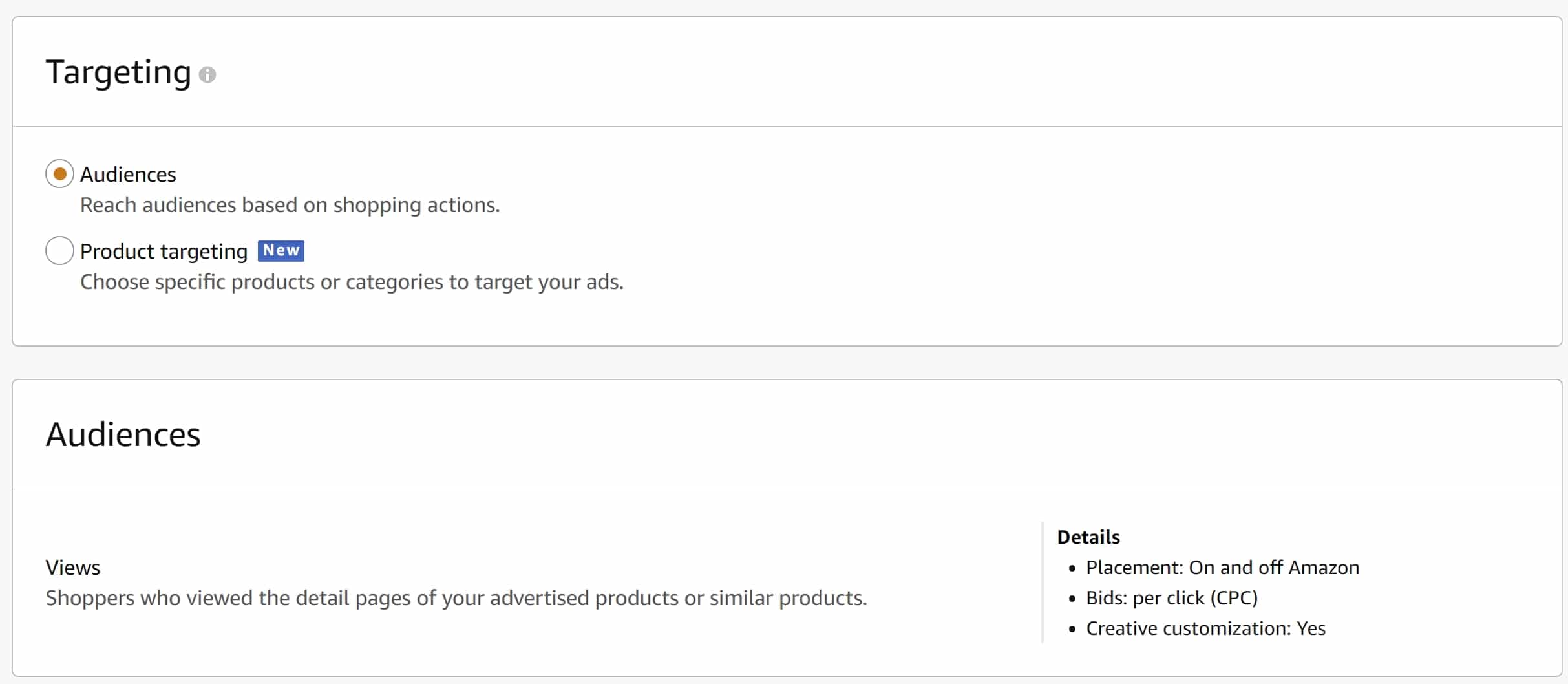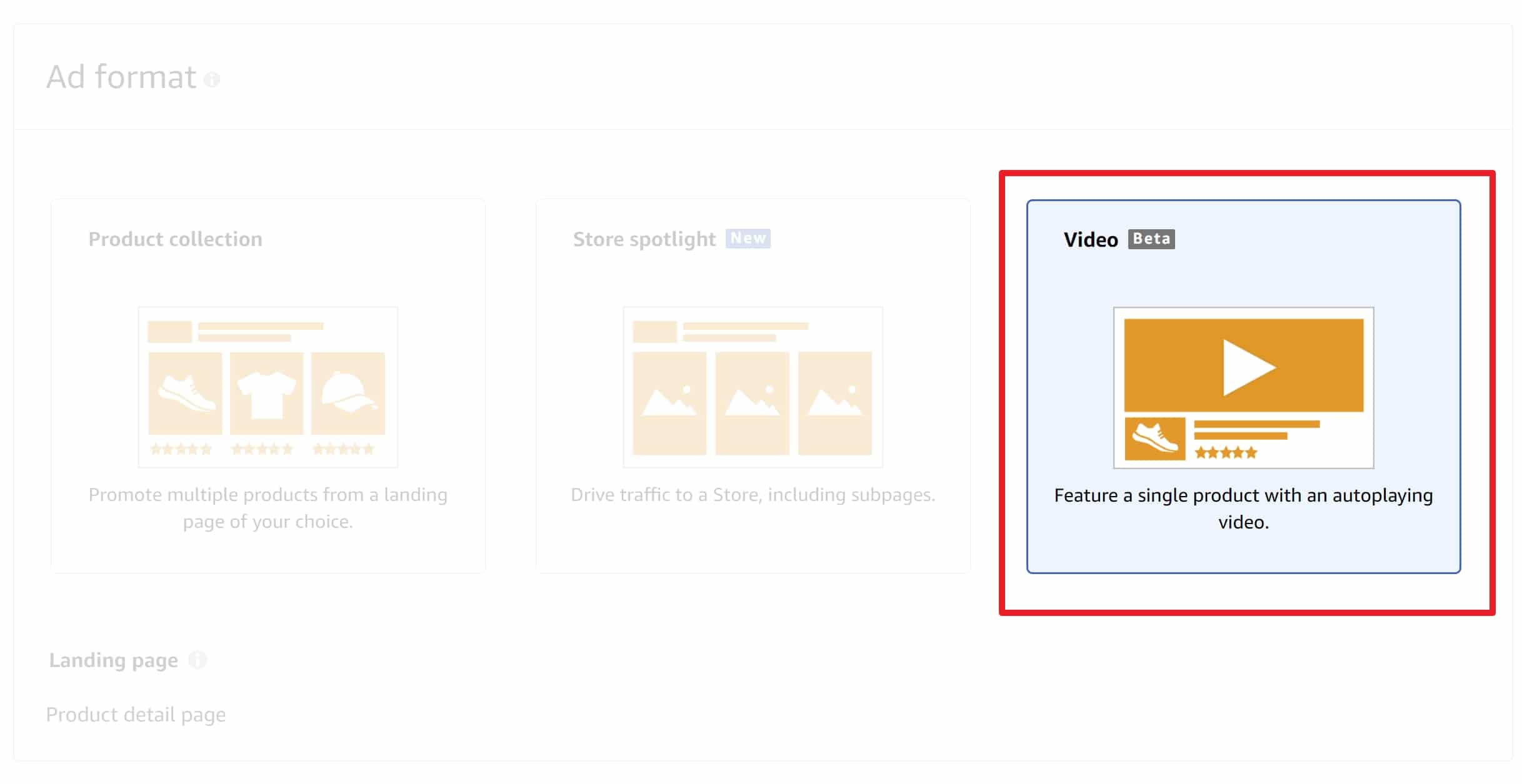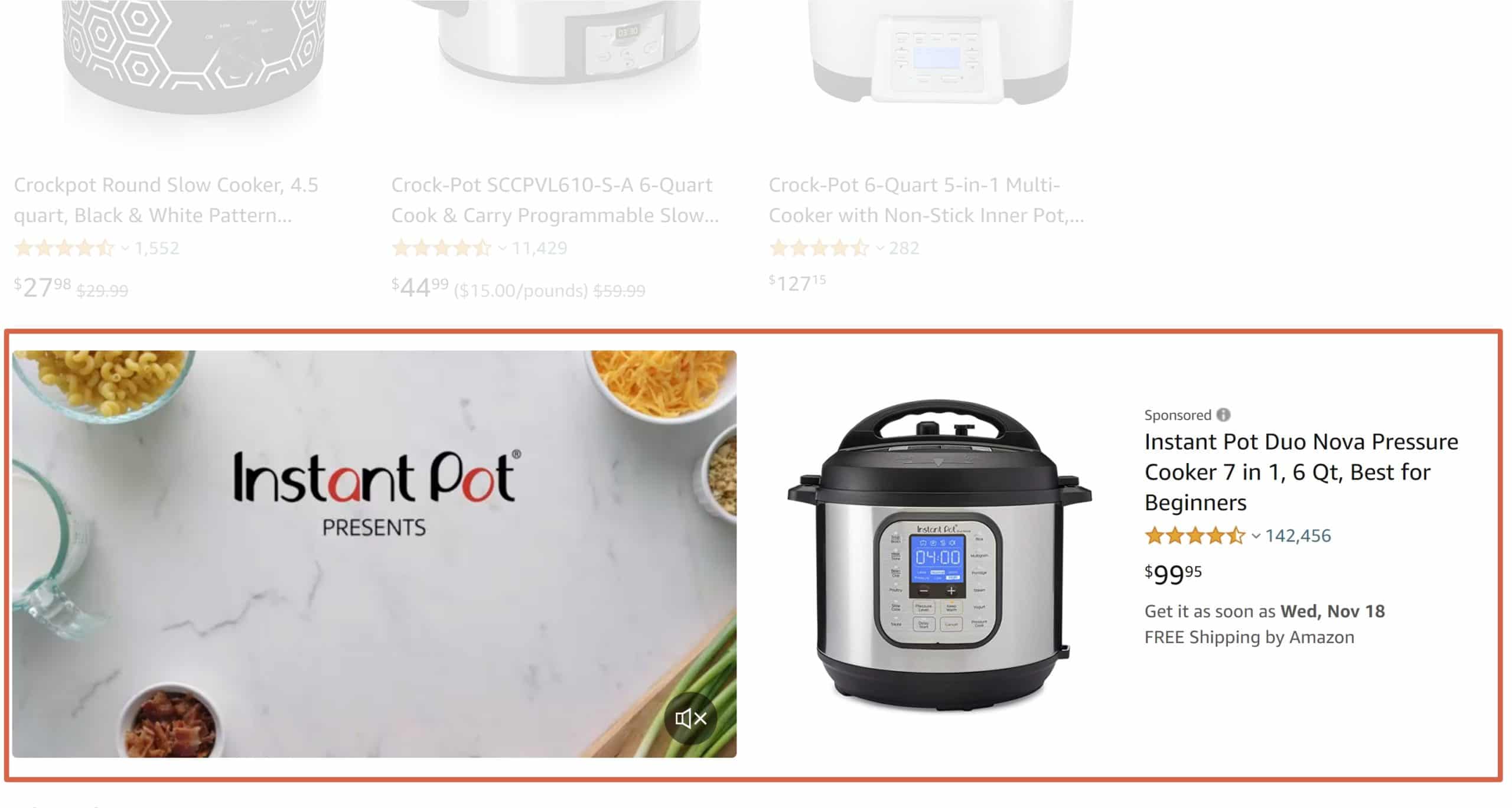Four Lesser-Known (and Cheap) Amazon Advertising Methods
Amazon has rolled out a slew of new advertising options in the last several months for everything from Display Ads to Video ads. This is on trend with Amazon continuously evolving into a pay-to-play sales channel.
Like everything on Amazon, some of these advertising options are more effective than others. In this article, we'll break down which ones are worth your effort and how much you should budget for them.
Related Podcast: E348: 4 Amazon Advertising Methods and How Much You Should Spend on Them
Related Reading: Amazon Advanced PPC Guide
Sponsored Display, Sponsored Video, and NARF Ads Overview
| Targeting Type | Pros | Cons | Location | Keyword Budget |
| Sponsored Display—Product Targeting | More real estate on your competitors’ ASINs | No granularity in reporting | Mostly product detail pages on Amazon but can be other Amazon pages as well | 25-50% of your Automatic Campaigns keyword bids |
| Sponsored Display—Audience Targeting | Allows you to capture off-Amazon traffic. The only way to retarget Amazon traffic. |
No granularity in reporting. Expensive bid amounts. Most retargeting is done for people who have viewed similar products, not necessarily your products. |
Varies. On or Off Amazon. |
10-50% of your Automatic Campaigns keyword bids |
| Sponsored Brands —Video | Video can convert very well. ACOS can be low. | ACOS can also be expensive if the videos are poor. | Search results on Amazon | 50-100%+ of your Automatic Campaigns keyword bids |
| All ad types—NARF Listings | Can propel your NARF sales. Less competition and lower keyword bid amounts than .com. | No way to easily port existing Campaigns to Canada/Mexico. | Varies | 25-50% of Your US Campaign keyword bids |
Amazon Sponsored Display—Product Category Targeting
Sponsored Display ads are similar to Sponsored Brands ads except they don't appear at the top of search results but are scattered throughout a variety of placements, mostly on product detail pages. See the example below.
Your ads can run on Amazon desktop and mobile, both on detail pages and across other Amazon pages. Your ads can be configured to reach audiences off Amazon across third-party publishers.

Sponsored Display comes in two varieties: Product Targeting and Audiences Targeting. For Product Targeting, your ads will only appear on Amazon as opposed to Audiences Targeting where your ads will appear on and off of Amazon.
With Product Targeting ads, you will select a list of ASINs or categories that you want to target (very similar to Sponsored Products manual campaigns). Generally, targeting a specific list of ASINs will yield better results compared to category targeting.
We've had mixed results with Sponsored Display Product Targeting. Display ads will almost always universally perform worse than ads generated after a user search (this goes for Amazon advertising or Google advertising). As such, your budgets for Sponsored Display should be far less than for Sponsored Products—25% to 50% of your Sponsored Products budgets is a good estimate to start with. You can then adjust after, depending on the performance.
How to use it: Advertising - Sponsored Display -> Targeting (Product targeting)
Amazon Sponsored Display – Previous Shoppers
Sponsored Display gets really interesting when you start using the Audiences feature. With Sponsored Display Audience Targeting, you get to retarget people who have visited your product pages and similar product pages both on and off Amazon.
Unfortunately, with Sponsored Display Audience Targeting, there is no transparency in terms of your ad placements (i.e., where/when they're appearing on Amazon and when/where they're appearing off of Amazon). In fact, there are no targeting options available. You pick your products and bid amount, and that's it. This in contrast to almost all advertising mediums where you can target either by keywords, product, or category.
As mentioned above with Sponsored Display Product Targeting, display ads (whether on Amazon or Google or other ad platforms) almost always perform worse than search-based ads. In fact, as Sponsored Display Audience targeting ads are shown both on and off Amazon, your performance will likely be even worse than Sponsored Display Product Targeting ads. As such, 10% to 50% of your Sponsored Products budgets is a good estimate to start with (and then adjust after, depending on performance).
How to use it: Advertising - Sponsored Display -> Targeting (Audiences)
Sponsored Brands—Videos
Sponsored Video is slightly buried away within Sponsored Brands. Sponsored Video may be the best advertising type discussed here.
A Sponsored Brands Video ad is simply a video that will play featuring your product that will bring users to your product detail page when clicked.
These videos will automatically play on mute within the search results page. You will only pay when someone clicks on the ads.
Sponsored Brands Video ads can be a coupe because they can convert extremely well AND you do not pay per impression, only per click. This means you get the opportunity for serious branding without having to pay anything for it potentially. Most others platforms that serve video ads (think YouTube) charge on a CPM (cost per 1000 impressions) basis.
With Sponsored Brands Video you target keywords just like you would with most other ad types.
The major drawback of Sponsored Brands Video, and the reason most people aren't using it, is because it requires you to actually have videos already made for your product (check out our guide on making product videos).
How to use it: Advertising - Sponsored Brands -> Video
PPC Advertising in Canada/Mexico for Your NARF Listings
So this one isn't really a new advertising option from Amazon. Rather, it utilizes advertising for a relatively new service from Amazon—North America Remote Fulfillment (NARF).
North America Remote Fulfillment allows your Amazon.com products to be offered to consumers on Amazon.ca and Amazon.com.mx. If you're not using it, you should be (Check out our guide on how to get started with NARF).
Once you're enrolled, your listings will start to show up on Amazon.ca and Amazon.com.mx as Prime-enabled. But just like you almost certainly advertise your listings on Amazon.com, you need to advertise your products on Amazon.ca or Amazon.com.mx as well. Your existing advertising campaigns will not target Amazon.ca or Amazon.com.mx.
The good news is that advertising on Amazon.ca and Amazon.com.mx is often much cheaper than advertising on Amazon.com due to less competition.

To set up your campaigns, navigate to your Amazon.ca or Amazon.com.mx Seller Central dashboard and create your campaigns from scratch, just like you would for Amazon.com. Unfortunately, there's no easy way to copy your campaigns). Simply creating some automatic campaigns for your NARF-enrolled products is one of the easiest wins you can get.
Conclusion
Of all of the advertising options talked about here, creating ads for your NARF listings is probably the best place to get started and is going to reap the biggest benefits at the most affordable costs. Simply creating automatic campaigns for your products will cause a big increase in your NARF listings. After this, Sponsored Brands Video can be very effective IF you already have videos created for your ads. Finally, Display ads can help you reach untapped audiences, but the costs can be prohibitive. Keep an eye on your budgets.
Which Amazon advertising option has been most effective for you? Let me know in the comments section below.







